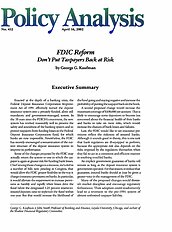Some of the changes proposed by the FDIC may actually return the system to one in which the taxpayer is again at greater risk for funding bank losses. Chief among those changes is a measure, included in a number of bills now pending in Congress, that would allow the FDIC greater flexibility in the way it charges insurance premiums on banks. In particular, it would alleviate the requirement to increase premiums as harshly and rapidly when losses drive the fund below the designated 1.25 percent reserve-to-insured-deposits ratio to replenish the fund within one year. But that would increase the likelihood of the fund going and staying negative and increase the probability of putting the taxpayer back on the hook.
A second proposed change would increase the maximum coverage of $100,000 per account. That is likely to encourage some depositors to become less concerned about the financial health of their banks and banks to take on more risks, which would increase the chances of bank losses and failures.
Last, the FDIC would like to see insurance premiums reflect the riskiness of insured banks. Although it sounds good in theory, this is one task that bank regulators are ill-equipped to perform, because the appropriate risk also depends on the risks imposed by the regulators themselves when they fail to act in a consistent and efficient manner in resolving troubled banks.
An implicit government guarantee of banks will remain as long as the deposit insurance system is government operated. For that reason, to reduce that guarantee, insured banks should at least be given a greater voice in the management of the FDIC.
Many of the proposed changes would diminish market discipline and encourage regulatory forbearance. Their adoption could inadvertently lead to a reversion to the pre-1991 system of almost unlimited taxpayer liability.

